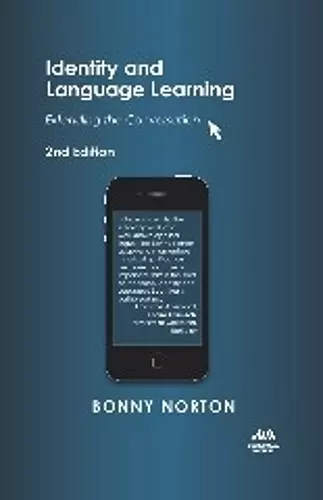Identity and Language Learning
Extending the Conversation
Format:Hardback
Publisher:Channel View Publications Ltd
Published:4th Oct '13
Currently unavailable, and unfortunately no date known when it will be back
This hardback is available in another edition too:
- Paperback£17.95(9781783090549)

Identity and Language Learning draws on a longitudinal case study of immigrant women in Canada to develop new ideas about identity, investment, and imagined communities in the field of language learning and teaching. Bonny Norton demonstrates that a poststructuralist conception of identity as multiple, a site of struggle, and subject to change across time and place is highly productive for understanding language learning. Her sociological construct of investment is an important complement to psychological theories of motivation. The implications for language teaching and teacher education are profound. Now including a new, comprehensive Introduction as well as an Afterword by Claire Kramsch, this second edition addresses the following central questions:
- Under what conditions do language learners speak, listen, read and write?
- How are relations of power implicated in the negotiation of identity?
- How can teachers address the investments and imagined identities of learners?
The book integrates research, theory, and classroom practice, and is essential reading for students, teachers and researchers in the fields of language learning and teaching, TESOL, applied linguistics and literacy.
This book is open access under a CC BY ND licence.
The publication of Bonny Norton's Identity and Language Learning in 2000 was a landmark moment in the field of additional/second language learning. The countless discussions in journal articles, research reports and PhD theses in the past decade testify to the power of her multi-faceted and generative ideas. I have no doubt that this revised edition will be on the 'must read' list of anyone concerned with additional/second language learning and language education more generally.
-- Constant Leung, King's College, University of London, UKUniting impeccable scholarship and an enduring passion for social justice, Bonny Norton's 2000 book Identity and Language Learning is republished here with a magisterial new Introduction by the author and an inspirational Afterword by Claire Kramsch. The book demonstrates anew the intrinsic power of Norton's constructs of investment, imagined identities and imagined communities, and the paradigm-shifting impact of her theory of identity on an ever-expanding set of questions, contexts, and interdisciplinary approaches to research and teaching in second language education and applied linguistics.
-- Nancy Hornberger, University of Pennsylvania, USASince the publication of the first, pathbreaking edition of this now-classic text, identity has become a central term through which applied linguists have been able to explore the changing, complex and contradictory struggles we encounter as we learn languages. This book has become one of the most significant of the last decade, and will continue to provoke thought, research and discussion for another decade. A key text for any applied linguist.
-- Alastair Pennycook, University of Technology, Sydney, AustraliaStrengthened by the thorough updates in the new Introduction and the context provided by Kramsch in the Afterword, the book makes a persuasive case for language teachers to regard our learners and their investments in a more holistic light. It may also shed some illumination on our experiences as L2 learners ourselves.
-- Anna Husson Isozaki, Gunma Prefectural Women’s University, Japan * JALT Journal, 37.1, May 2015 *The book is invaluable for both novice and experienced SLA researchers and scholars interested in inquiring about language learning and identity. Norton has successfully combined international literature on SLA, identity, and social justice with pedagogical suggestions to create a volume that effectively takes a step forward in bridging the gap between research and pedagogy on language learning and learner identity in ESL environments. Even though these chapters center on language learning in ESL context, practitioners working with other languages could benefit from the findings and pedagogical implications.
-- Andrea Lypka, University of South Florida, USA * LINGUIST List 25.3857 *In sum, this book is of great value to readers who are familiar with Norton’s work as well as to those who are encountering it for the first time. For graduate students, this book is a must-read, because it provides initial knowledge about identity research and a good example of narrative inquiry. For researchers and educators, this second edition is also a helpful resource; the compelling introduction and the inspirational afterword spur readers to dwell on those “unsettling issues” (p. 19) in identity theory regarding the relationship between societal structure and human agency, identification and negotiation, multiplicity and strategic essentialism.
-- Haiying Feng, University of International Business and Economics, China * TESOL Quarterly, 20ISBN: 9781783090556
Dimensions: 234mm x 156mm x 18mm
Weight: 482g
232 pages
2nd Revised edition